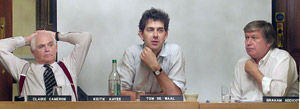During July 18-27, 30 journalists from Armenia, Azerbaijan and Georgia paid a visit to Great Britain in the framework of a program funded by the British Council and British Government.
The program was entitled “The role of Mass Media in monitoring the activities of government” and was organized by the British Council. The program was sponsored by the British Government and UN office of Yerevan.
This program was aimed towards getting familiar with their experience of monitoring, broadcasting and publishing. Almost everything was discussed during the seminars, which lasted 5-6 hours a day. Of course, we can’t understand everything the way they do because we live in different “worlds” and our outlooks are different.
On the one hand, their opinions seem strange, how they draw details and broadcast, but on the other hand, we understand that it is what we all should have. It is strange but usually our society associates the European standards with other things and does not pay attention to the most important things, such as human rights, freedom of speech, etc. The editor of “World News” newspaper with its 3 million copies says proudly that due to their efforts, a minister that had committed violations had been replaced. Besides that, you can hear how they criticize their own prime-minister on BBC. Can you imagine what will happen if the Armenian national TV company strongly criticizes the president? I can’t imagine that either.
These are the main achievements that we should have instead of getting financial aid to implement programs aimed towards gender equality, which was surprising for them too.
In the framework of the educational program, two lecturers spoke; one represented the BBC, and the other one – the Reuters. I was surprised to see the former speaker for Tony Blair there. We know that there are issues that should be kept confidential there too, but in spite of our officials they try to collaborate with Mass Media. In the framework of our educational program we visited the editorial offices of BBC, “World News”, “Reuters” and “Dow Jones Newswires” that collaborated with “The Wall Street Journal” and CNBC TV company. I found out from Dow Jones about an interesting regulation; their employees don’t have the right to purchase company stocks. Such terms and regulations are targeted to strengthening the independence of their journalists.
I was waiting for the speech of Tom De Vaali impatiently (IWPR). In contrast to the other speakers, he was well-informed about the Southern Caucasus region. Some of our readers may have heard about his book entitled “Black Garden”, dedicated to the Karabakh conflict. Armenians and Azeri people expressed different point of views on the book.
“I came to that region and was surprised much. Two different worlds and enemies survive in that small territory. I decided to write about that issue because I could not find any book that would picture the situation from different views”, said Tom De Vaali. He said that he had taken interviews from over 120 representatives from both sides and the book was based on their ideas. He says that his book is not perfect, but there is no competition because it is the only one in its kind.
In regard to Mass Mediam De Vaali said that sometimes the mass media doesn’t go in favor of peace and creates enmity. “The worst thing is the intolerance among the two societies, which is unacceptable”, said Tom De Vaali and added, “Anyone whom I have talked to began to speak by saying the following words; “I am probably the most peaceful person in the world, but…””
One of the main aspects of the program was definitely the idea that one of the reporters, Kate Hais was saying all the time: “We are not Armenian, Azeri, Georgian or British journalists, we are just journalists”. When Armenians and Azeri people live in the same hotel for ten days, have breakfast in the morning together and talk to each other, in the end something really changes.

